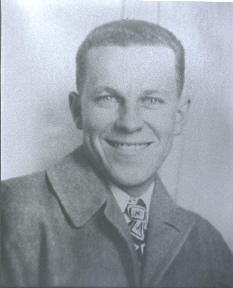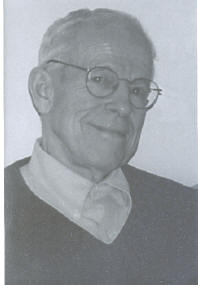THE BEAUTIFUL AMERICAN


There is a special aethereal place where Ellington can take you when reeds and brass weave those harmonies to arrange themselves in a beatific formation. The closest I can come to a visual analog would be: enormous cumulus clouds suffused with orange against a blue sky at about 20 minutes before sundown. This configuration might be seen over Scio township, or perhaps Lake Michigan. The image occurred to me many times as I engineered the Duke Ellington hour for WCBN’s senior musicologist, Dave Crippen. I see him now, sitting with eyes closed, headphones at near maximum volume, absorbed and mollified by the sheer grace and immaculate ease of Duke Ellington and Billy Strayhorn’s music. For 24 years he hosted "The Duke Is On The Air". This program positively altered the cultural dynamic of Ann Arbor, Michigan. For this he should be remembered with love.
I have a theory about people who participate in radio all the time—as listeners, or especially on the transmitting end of the operation [Crippen manned both posts with great steadfast dedication]. When radio people leave their bodies they enter into the ionosphere and become a part of the air signal. If my theory is true [and to me it is or I wouldn’t have brought it up] then habitual cell-phone users—those who stand in crowded public buildings or on street corners, barking and shrieking their private phone conversations into the ears of passers-by—these people would then become part of the cell-phone signal field, ever to be catalyzed by babbling consumers keeping "in touch" with each other. Alarming thought.
I do like my radio wave theory better. It serves me well when I commence broadcasting words & music. For I sense the presence of many spirits: J.C.Heard, Morris Lawrence, Britt Woodman, Milt Hinton, Charlie Parker, Albert Ayler, Sun Ra and June Tyson. I’ve got spirits all around me all of the time. Lately, as I research early Jazz for a Sunday morning retrospective on WEMU, I surely feel the presence of Dave Crippen.
Now this is a manifestly ironic way to begin a tribute to Dave, as he was an often mercilessly outspoken self-proclaimed Atheist of great practical magnitude. I, on the other hand, might easily be described as a mystical animist. I believe that the rocks in the back yard are alive; that Lake Michigan remembers Bix Beiderbecke, and that the essential magnetic constituents of Johnny Hodges and Harry Carney were present at the formation of the Earth’s crust billions of years ago, even as they later stood as Men in Ellington’s band during what we call the 20
th Century. As a poet and a musicologist, I consider these musicians to be elemental.How interesting, that Dave Crippen—Atheist—spent so much of his life actively celebrating Duke Ellington’s every deed. For Duke was unavoidably religious. He made a point of expressing his Christianity in no uncertain terms, even as he simultaneously worshipped female sexuality on a daily basis. A complex creature, who spoke as frankly on one topic as on the other, obviously sensing no contradiction or separation betwixt his devotions.
Ellington’s spirituality, and the role of Christianity in Afro-American life, is different as can be from the nightmarish excesses of the "Religious Right", currently poised to take over the government of the United States of America. That sort of Christianity, so devoid of organic solidarity with the Earth, with women, and with anyone who isn’t a member of the most entitled classes—that is obviously the sort of "religion" which usually caused an allergic reaction of sorts in Dave Crippen’s consciousness. Various radio people can testify how, during the airing of something with conspicuous religious content, Crippen would suddenly be on the other end of the phone line growling Let’s have a little separation of Church and State!
Given the current political climate in Washington, it seems to me Crippen’s refusal to assist organized religion in any way, shape or form was decidedly healthy and more truly American than anything these fools can come up with. I do suggest that they be deprived of the label "Conservative"—I think Barry Goldwater was the last one who fitted that title. These people don’t conserve anything. They should be called Squandervatives instead. "Truth in advertising", Dave would say, and we would both sigh as we turned our attention back to the record on the turntable.
Crippen existed in my life years before I actually knew him up close. I knew his daughter, spunky little Sue, back in high school days. She, like my brother Zach, chose a theatrical career and already shone with almost impossible stage presence as a teenager. [Man, you should’ve seen her do Moliere!] Sue and I appeared in Eugene Ionesco’s The Bald Soprano—a decidedly powerful influence on young Arwulf, budding Dadaist. I saw in Sue back then certain elements which I later recognized as shades of her father’s persona & sensibilities, modified by her own individuality.
And so it was that when I met Dave Crippen in the middle 1980s at WCBN FM I somehow already knew him. He had at that time a U of M student engineer who diligently cued up records and provided Dave with a live microphone whenever something needed saying. I was often working on some project in the next room and soon found that I could utilize the fabulous Crippen memory bank whenever I had questions about culture and history.
It wasn’t until a bit later that I learned how Dave worked for years at the Henry Ford Museum as an Archivist. As curator of Special Collections, he headed the Edsel Ford Auto-motive Design Oral History Program. This made perfect sense, for how he loved having access to a well-researched reference work! Many times, after I’d become his engineer, the question would arise: who wrote that old song? We shared a fascination with Tin Pan Alley composers, their melodies and often quaintly contrived lyrics. Dave was adamant about identifying the culprits. "Look it up in Kinkle", he’d say, and I’d consult the Roger D. Kinkle Jazz & Popular music index with great pleasure.
What made Dave Crippen into the man I sat in with on Sunday evenings, so carefully presenting Duke Ellington’s music on Radio Free Ann Arbor? He was that remarkable blend of nominally conventional middle-class Midwestern American WWII veteran and dynamically, heroically, endearingly unconventional Hipster. In a society where Hipsterism became commodified and co-opted under the spell of the same cluelessness with which Time Magazine trivialized the Counterculture and progressive social movements of the 1960s, Dave maintained a manifestly Hip reality by devoting himself to Jazz and supporting it religiously. He was quite fond of Word Jazz poet Ken Nordine, and sounded in fact quite a bit like him.
When WCBN conducted an extensive Lenny Bruce Radio Marathon, Dave informed me that he used to play Lenny’s more accessible records for his kids! Sue apparently used to imitate Lenny’s vampire routine Enchanting Transylvania with glee, exclaiming: "Poppa, poppa, it’s so good to be out of the box!!!" Dave actually knew Lenny Bruce as a friend, and cherished the memory of hanging out while Lenny kept him in stitches with his outrageous takes on American culture. "Funny thing, I never knew he was into drugs. I remember driving to Chicago and hearing on the radio that Lenny Bruce was dead of an apparent drug overdose. I guess I was kind of naive; I felt almost betrayed."
You can imagine how precious Dave’s friendship was for the likes of me. I know now that he influenced my gradual path into maturity, and I feel his influence in my bones. He was a great role model in many respects. Intellectually stoked and ready to respond to anything in this life with an often astonishing vehemence, Dave spoke his mind without hesitation, bluntly calling the shots as he perceived them.
I never knew what he’d accept or reject when it came to the music. Someone’s interpretation of an Ellington opus could either be a source of infinite delight [Rahsaan Roland Kirk invariably met with his approval] or might instead cause Dave to make one of his wonderfully expressive "distaste" faces: his brow would wrinkle up and he’d pull a clearly defined frown. Part of the fun was watching him respond with such dramatic intensity.
I distinctly recall not knowing enough about Ellington during my first five years in broadcasting. Pieces of the puzzle had danced before me, but I was only aware of sketchy shadows and bright moments in the vast landscape of Jazz and everything it touches, which is literally most everything. My "Real Black Miracles" show followed Crippen’s "Duke" and I soon learned the gentle art of continuum, beginning my first set with Ben Webster or Clark Terry, or perhaps Abdullah Ibrahim, whose South African Jazz grew directly from a personal friendship with Mr. Ellington. Eventually I renamed my first hour "Open Letter To Duke", after a piece by Charles Mingus. This strengthened both my show and Dave’s, creating a mutual respect between us.
I learned to listen for the locomotive bass fiddle pulsations of Wellman Braud. To recognize at once the unmistakable growling of Bubber Miley, Cootie Williams and Tricky Sam Nanton, each with his own tone. To stop and admire the mellifluous maneuverings of Johnny Hodges, and to note with alacrity the rare occasions when he would switch from alto to soprano saxophone. To watch for Rex Stewart’s bent notes coming off the valves half-cocked, glistening like hermit crabs in the tidal pool of a three-minute record. My bones resonated with the eminently dependable Harry Carney, his baritone sax voicings solid and steady as feldspar or obsidian many fathoms below the surface of the Atlantic ocean. Barney Bigard’s clarinet is present in all sunlight filtering through clouds. The Ellington orchestra became my rarified table of the Elements.
Listen, eventually I had to give up the Sunday night radio action. My wife Lindsay correctly hinted that if I kept it up I’d probably do myself in, as I already knock myself out at WEMU on Sunday mornings. Six hours of radio, sometimes more—well, I’m not getting any younger. Dave seemed to sense that it was wearing me down. He’d bring me little bags of pared raw vegetables wrapped in moist paper towel inside of a plastic bag, and maybe get me some pretzels and a ginger ale out of the vending machines down the hall. Dave became very much like an uncle to me. After someone else took over as his engineer, he called me almost every week, offering little bits of information or just thanking me warmly for playing the music that he loved. He was particularly wild about Keynote sessions from the early 1940s. Told me he used to buy the original 78 rpm platters when he was in the Navy. When I played the best Jazz of the period, he took it personally.
As I write this I’m listening for the fourth time today to one of Dave’s favorite latter-day Ellington albums: a tribute to Billy Strayhorn entitled And His Mother Called Him Bill. As the orchestra kicks up splendidly or stretches out purring in a slow groove, I am reminded of another Ellington selection, recorded in 1962 with Louis Armstrong. The song is instrumental, and sounds for all the world like something written by Charles Mingus, with whom Duke in fact made a record that very same year. The title was appropriate then and it stands at the moment as the perfect epitaph for my good friend Dave Crippen: The Beautiful American.
Signed Elements ©
Individual Authors
Unsigned Elements © Agenda Publications, LLC